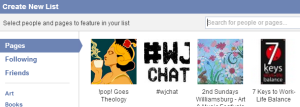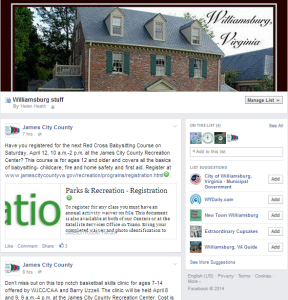Facebook Users: Are You Being Served?
There’s been a lot of chatter of late regarding changes Facebook continues to make to its algorithm for serving content to its users. But most of that chatter has been focused on page admins–things you can do to try and get around FB’s ongoing attempts to goad brands into paying for their content to get distributed, regardless of each brand’s potential budget for doing so. This pay-to-play system seems to me an attempt to make the companies that profit from their presence on FB shell out some “rent” for doing so, and that isn’t totally unfair. But what of the websites, blogs, fan pages and nonprofits that do NOT profit from their presence on FB? And what of you, the users who actually want their content?
![]() Today, FB muddied the page admin waters further by telling us that you’re not necessarily even seeing our posts even if FB is “serving” them to you. So all we know is how many times FB throws our posts into your feeds, and by golly, the numbers tell us it’s not very often–whether it’s how it’s served or how it’s seen. Honestly, the marketing folks will spend hours and hours researching how to game these feeds to reach you more frequently, but ultimately, *you* have opted in to our updates and as such it’s up to *you* to customize your FB use to better see us, if you really want to see us. (And we hope you do.)
Today, FB muddied the page admin waters further by telling us that you’re not necessarily even seeing our posts even if FB is “serving” them to you. So all we know is how many times FB throws our posts into your feeds, and by golly, the numbers tell us it’s not very often–whether it’s how it’s served or how it’s seen. Honestly, the marketing folks will spend hours and hours researching how to game these feeds to reach you more frequently, but ultimately, *you* have opted in to our updates and as such it’s up to *you* to customize your FB use to better see us, if you really want to see us. (And we hope you do.)
So, without further ado, here are three ways you can make sure you’re seeing page posts while using Facebook:
1. Use the Page Feed

The page feed generates a real-time feed of pages you’re a fan of. By real-time, I mean the kind of feed that puts things in order based more on recent comments than on recent posts, an ongoing problem wherein Facebook thinks it knows what you want better than you do. Oh, wait, I am digressing. But if your “recent activity” feed is full of your friends’ posts, the pages feed will give you the closest approximation of the same feed but with page content instead of friend’s content.
It’s easy to access and save: Look for the orange flag in the left-hand navigation of your Facebook page, or just access your Facebook page feed directly.
2. Use Interest Lists
Interest pages generate a specialized feed with content that you specify. They are different from Friend lists in that you can actually set them up in a way that others can access them. That said, I prefer to create my own. I recently was offered a job in an area I don’t know all that well, so I started seeking out pages in that area to like so I could learn more about it.

Facebook remembers that you’ve bundled posts together this way and will at times let you know that there are new posts in the list.
Add a page to a list by accessing the dropdown menu at “Liked.” Choose “Add to Interest Lists,” and you will get a picklist of existing lists or the option to create a new list.

When creating a new list, you’ll be prompted to add other pages to the list–or people you follow, or friends. Basically, suppose you are into yoga. You can add yoga pages, yoga experts you follow, and friends whose FB focus is primarily yoga to your yoga list and have a topical stream dedicated to information about yoga.

Once you create a list, you’ll want to be able to come back to it easily. There are two ways to do this. The first way: Create a bookmark file in your browser and save links to lists you want to access from one click. The other way: Add the list to “favorites” and it will always appear in the left-hand navigation of your Facebook page.
Then, when you load your FB list, you’ll be presented with an easy to scroll-through feed of topically-related page content!

3. Turn notifications on
 For those pages that have can’t miss content–your favorite news sites or magazines, that college you’re dying to attend, the blog you want to see every post from but can’t remember to check now that Google Reader is dead–whatever the case: You can turn on notifications for your absolute favorite pages. Of course, this assumes you have notifications turned on in the first place, but nothing makes me happier than seeing a notification pop up that the rarely-updated association page I want updates from has finally posted info on an upcoming conference I want to attend. It’s a post I’d miss in the grand scale of noise on FB, but I don’t want to miss it and I definitely don’t want to rely on Facebook to “serve” it to me.
For those pages that have can’t miss content–your favorite news sites or magazines, that college you’re dying to attend, the blog you want to see every post from but can’t remember to check now that Google Reader is dead–whatever the case: You can turn on notifications for your absolute favorite pages. Of course, this assumes you have notifications turned on in the first place, but nothing makes me happier than seeing a notification pop up that the rarely-updated association page I want updates from has finally posted info on an upcoming conference I want to attend. It’s a post I’d miss in the grand scale of noise on FB, but I don’t want to miss it and I definitely don’t want to rely on Facebook to “serve” it to me.
Does anyone actually prefer sponsored content to being able to curate your own experience? I certainly don’t. Feel free to share your own techniques for better Facebook content consumption in comments!
Supermoon, June 2013
The “Oh, You Go to the Other Service” Phenomenon
This has happened to me at every church I’ve attended semi-regularly as an adult: When I go to an event, the people at the event, when introduced to me, ask, “Oh, do you go to the 8 o’clock service?” At churches where there are more than two services, I get “So which service do you go to?” There is, I guess, an underlying assumption that in order to be a part of of church community, one must attend ONE of the services a church offers, and since they don’t see me there, I must go to the other one.
It has happened so regularly that I’m beginning to think there’s something to this, in spite of the fact that I have yet to actually meet a new person (i.e. be introduced to a strike up a conversation with someone, not just shake their hand at the Peace) within a church service.
Now, for the baggage part of that: I don’t go to the 8 a.m. service, and I sometimes feel like there’s something judgmental inherent in the assumption that if I don’t go to one, I go to the other. There’s a big part of me that feels like I got so much church service between the ages of roughly 3 and 15 that now, when I go, it’s a recitation. That’s not to say there’s not comfort in it: there is, it’s like meditation, it’s like practice, a regrounding of oneself in the pray, listen, reflect, repent, commune cycle of the Anglican liturgy.
But I really don’t go every week, at least not to one, single church. Sometimes I’m traveling and visit other churches. Sometimes I go to church in Second Life. Sometimes I flip open my prayer book right here in my office and discover something new in it. Sometimes I’m out hiking and it’s just enough to know that presence within the cricket and bird song, the rustling leaves, and the laughter of a partner who loves you pushing you along.
Truth is, I have trouble imposing structure on my life — structure tends to impose itself on me, and the results can be painful. But on the other hand, I find that I’m always in a place of discovery and delight. I think it’s part of my ENFP wiring, that I like the unpredictability of “church where you are,” and thrive on it.
So what service do I attend? The one in my heart. I’m still trying to figure out how that works in community, but I have a sneaking suspicion it has something to do with why I have so many Episcopal priests among my Facebook friends.
Pandor—uhhhhhhhhh
 Usually, among my faithy colleagues, I’m the early adopter for most new toys. Being a DJ in my former life, it’s hard to let the control go, so I’d never given Pandora a look until the Very Rev. Nick Knisely, who’s oh-so-very VERY (heh, had to!) asked me why I hadn’t told him about its musicky goodness. I was caught clueless, and sheepish. See, I use Playlist.com to build embeddable playlists, Blip.fm to microblog my various earworms, iLike.com (via Facebook) to get updates from bands I like, and Last.fm to explore music (and I still use gnod, so there). So, I really didn’t think I needed another music tagging service to keep track of.
Usually, among my faithy colleagues, I’m the early adopter for most new toys. Being a DJ in my former life, it’s hard to let the control go, so I’d never given Pandora a look until the Very Rev. Nick Knisely, who’s oh-so-very VERY (heh, had to!) asked me why I hadn’t told him about its musicky goodness. I was caught clueless, and sheepish. See, I use Playlist.com to build embeddable playlists, Blip.fm to microblog my various earworms, iLike.com (via Facebook) to get updates from bands I like, and Last.fm to explore music (and I still use gnod, so there). So, I really didn’t think I needed another music tagging service to keep track of.
Nick+ had mentioned Pandora had iPhone integration so I decided to give it a whirl. Oh, Lord. See, I’m a woman of many genres, and finally I have a way to broadcast all of them on separate channels, tune into whichever I want, and share the results in all their crazy mishmoshedness.
So far I’ve set up Radio Helcat 80s, Radio Helcat Industrial, Radio Helcat Bluegrass and Radio Helcat Modern. And I’m quite sure I’m going to have to set up a Baroque channel, a movie score channel, and .. hmm. Eventually they’re going to have to cut me off.
But they, like every other social music service, totally lack any songs by Modern English other than that one we shall not name. That’s going to be the barometer, for me, of how fabulous a service is, because I will not rest until “Someone’s Calling” gets the love it deserves. (And for that matter, becomes my ring tone.)
A rewrite: What about Generation X?
I originally had this published at The Episcopal Cafe last fall, but I have a lot of new readers coming in from the blogosphere who aren’t of my faith persuasion, and, sensitive to their range of spiritual beliefs, I’ve recast it for the secular audience.
I was talking to a friend about the challenges we face by virtue of being born after 1970–well, of being gen-xers in general, and being caught between the “Boomers” and the “Millennials,” and how this affects us in our professional and vocational lives. It came up last week on an email group, and I passed it along to several of my friends who are doing their part, in my humble opinion, to attract people like me to organizations that share a concern that their membership may be overly grey-haired.
Not to put too fine a point on my own grey hair, mind.
On Sept. 20, that group, which I can loosely describe as a group of 20/30-something peers approaching spirituality with a bit of a noncomformist edge, met over margaritas to discuss, as one friend put it, “the theological / ecclesiological / missiological / tequiliological implications” of Harry Potter and the Deathly Hallows; indeed, the Harry Potter series as a whole. Decidedly not what my parents would call a church, by any stretch of the imagination, but it suits me better to “practice” than to “worship.” And I got to thinking about it: why was this something I could be so down with, especially knowing that somewhere out there, another focus group was emerging to study my generation. Yawn.
The more I see things with top-down architectures being applied to us youngish people, the more I realize it doesn’t work. I’ve seen great ideas committee-ed to death all because people older and wiser than me must control every outcome of every plan of every initiative. And the more input I got from friends of mine, the more I realized:
Your invitation to me to participate doesn’t mean much if you don’t let my input—and leadership—count. And that’s what I’m hearing from frustrated 30-somethings who want to take on leadership positions but still get flak for being slackers, which we really are not anymore and we’d like some credit. I originally wrote this about being a member of the Episcopal Church, but it’s true of many other organizations. I worked at a financial services magazine that refused every pitch I made about Gen-X prospects because we’re not buyers. I work for an association that’s trying to figure out how to attract people under 40 because we’re not joiners. One friend of mine added to the conversation that she’d like to see “‘young adult’ stricken from the cultural lexicon–for reasons that resonate with me: mortgage, career, family. Heck, my son is almost 15, and pretty soon I’ll be the young adult parent of a young adult.
So, if we’re not young adults anymore, and nowhere near middle aged (if 50 is new the 30, we’re actually teenagers), what are we? How do you address the wide demographic of a narrow slice of the population that’s holding an awful lot of cards and generating absolutely no buzz? Sure, skip us. Move on to the millennials.
Here’s my take on things, though. Generation X is the bridge between the Boomers and the Millenials. We were raised with enough technology that we’re conversant in the ways that today’s teenagers interact on social networks. But we also know how to dial a phone. We’re all wired in varying ways, but each succeeding generation is increasingly plugged in. Let me put it another way. Historically, many immigrants have come to America speaking only their native language. Their children, however, speak both languages fluently. But I know many cases where the grandchildren don’t speak anything but English, and the middle generation must help the bookending generations understand one another–literally. So what happens if you skip the middle generation?
Here’s an example I ran across recently. Blogs are a publishing platform that were adopted quickly by compulsive writers with varying degrees of web-savvy. I’ve had so many that it’s a wonder I can populate them all with random Helen/Gallycat brain noise on a regular basis, so I wax and wane with all of them. They’re a great way to distribute content, to self-publish (no, really, I’m more prolific than Stephen King!), to bypass censorious editors, to think aloud, to take the podium, to brainstorm in community. So of course, many organizations, seeing the value of being able to share content with one another, decided to barrel full speed ahead with a blog. Occasionally, some would enlist me to help get the blog off the ground, since I know the technology. One, in particular, was group that was looking forward to getting some ideas out there.
But they didn’t listen to my input on certain key issues that ultimately doomed the blog. The problem was that every post had to be approved by a committee. I felt like Cassandra, trying to explain to them why it would inhibit participation on the blog. It died a few months later, neglected and forgotten.
So how is this an example of why we, Gen X, are the translators? We are well equipped to understand social media, which is going to be the communications medium of choice for today’s young people. How is this changing the face of communications? My connections in the news media say it’s as revolutionary as Gutenberg and the moveable type printing press. Ignore this opinion at your peril. Blogs are just a part of what that next generation is coming online with. We can speak their language. We can speak the Boomers’, too, though. Did I mention my teenage son? Yes? What about my aging parents? How’s your retirement portfolio?
So anyway, back to the matter at hand. Don’t skip Generation X. We’ve seen it more than once. We’ve heard you ask how to reach us, and seen you form committees hoping to find the magic pill that will get us back in to your idea of an organization. To be honest, you might not. At least, not through the means you’ve traditionally reached out to people. In the new world, you don’t just program and broadcast; you invite, share and participate. I understand that it’s difficult to turn a ship around, and for an organization of any size to embrace change quickly is a frightening prospect. But by the time you bust out your magnifying glass and whittle down to the details of the new media environment and position yourselves in the emerging economy and get all that together in a strategic plan for the new millennium that started when folks my age actually WERE still under 30…
It’s not enough to study us. Listen to us, yes, hire us, absolutely. But most importantly—
Join us.
The original, published Oct. 9, 2007, is here.

